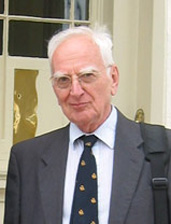Walter Holland
Year: June 17th, 2004
Location: London, England
Interviewed by: Blackburn, Henry
Abstract
Walter Holland has been particularly involved in major and early contributions of the UK to CVD epidemiology: demonstration of observer variation in blood pressure and respiratory symptoms. He provides insights on the epidemiologist-clinician tensions that so influenced UK attitudes locally and toward US work, based as they were on the Thomas Lewis school of experimental medicine with its primacy of mechanisms and disdain of statistics.
He provides anecdotes about the Platt-Pickering debate and about David Rutstein. He describes how separate early epidemiology academic programs developed at the London School and at St. Thomas’s and Guys Hospital. He indicates the skepticism of UK social scientists about the social class-occupational health disparities issue.
Holland characterizes UK contributions to CVD epidemiology as follows, the demonstration that: 1) there are real differences in disease rates despite systemic diagnostic differences (over- and under-reporting of CHD and respiratory disease deaths), 2) the risk factors are universal; 3) variability and precision in diagnosis and measurement were a particular UK strength and 4) peri-natal exposures influenced adult health. Otherwise, UK-US studies mainly complemented each other. He agreed that UK work in epidemiology and trials needs more brawn and US work more brain.
He sees more continuity in the field, historically and in the UK, in part because he doesn’t find infectious and non-infectious disease epidemiology involving separate issues or methods. (Henry Blackburn)
Quotes
Holland explains the British negative positions on the diet-heart theory
I would have said that there were two possible reasons for this, both of them somewhat historical. The first was that between the Wars experimental medicine was started by Tommy Lewis. People like Mc Michael, Sharpie Schafer, and so on, were his disciples, and Pickering. They considered that to be the way to truth. They could not understand that you could study associations. […]I think the second thing was that Charles [Fletcher], Archie [Cochrane], and many others, Donald [Reid], and I expect me, too, introduced the question of observer variability […] So that, I think, meant we were apart from the mainstream. . .[On the other hand] the majority of epidemiologists did not have interests in clinical medicine. They looked down on the clinician. Only Geoffrey [Rose] didn’t.
On the lack of agreement between clinicians and epidemiologists on what qualifies as scientific evidence, Holland opines
The academic was concerned with experiments and that was what Thomas Lewis and his disciples preached. Sharpie Schafer once said to me – and Sharpie Schafer was one of the disciples – he once said to me, ‘I don’t believe in statistics. Unless I can see it I don’t believe it.’
On the distinction between infectious and chronic diseases in epidemiology
I believe like Ed Kass that, in fact, the distinction between chronic disease and acute disease is nonsense. That one may cause the other. […] You should not dismiss the influence of infection on the etiology.
Full Transcript Access
Full transcripts of interviews may be made available to those engaged with original materials for scholarly studies by contacting us.
